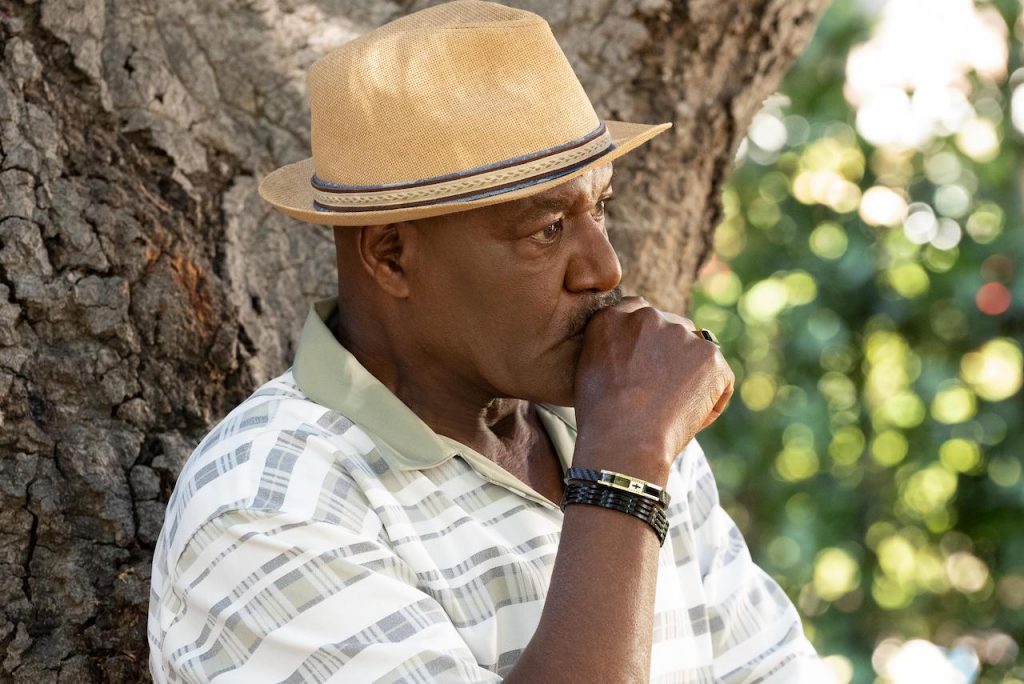“Paige Can’t Let Her Father Betray Her Again” Tracy McMillen Talks ‘Unprisoned’

The damage caused to millions of families by mass incarceration is a reality for many Americans. Tracy McMillen (Runaways, Mad Men) harnessed her life experiences to create a touching and humorous look at the prickly relationship between Paige Alexander (Kerry Washington) and her recently released from prison father Edwin (Delroy Lindo) who comes to live with Paige and her sixteen-year-old son Finn (Faly Rakotohavana) in her TV series Unprisoned on Hulu.
Curiously, Paige is a family and relationship therapist, but Edwin still has plenty of solid family advice to offer them. We caught up with Tracy to discuss her process to create Unprisoned.
Basing a TV show on one’s life story comes with its own set of challenges. How closely should Unprisoned mirror actual events or should the creator grant the show as much dramatic license as it needs to make its point?
“There’s a lot of overlap between Paige and me,” says McMillen. “They both have problems in their relationships. They both want to do good. They both want a healing. They want to be good mothers. They want to be good daughters.”
Despite the strong parallels, Tracy insists that Paige isn’t her. “Kerry Washington is an actor and an actor creates a character. I was never trying to be in control of that. I’m not a perfectionist and I’m not a control freak. I take it to the place and then I let the actors take it where they’re taking it because it’s fully a collaboration,” she continues.
Unprisoned is told in a thirty minute dramedy format, rather than a straight out comedy or a drama. In terms of balancing the drama with the comedy, “I actually think it’s like, it’s kind of fifty-fifty,” states McMillen. I know that life has so many humorous moments, and in the next second, it can turn into a very dramatic moment. You can’t separate the two. If you’re doing your job as a drama writer, it’s going to be funny sometimes. And, if If you’re doing your job as a comedy writer, it’s going to be dramatic sometimes. It’s the difference between emotionality and sentimentality.”
“Drama and comedy are fused and I was not interested in trying to separate them. They inform each other. They’re Siamese twins,” she continues.
Emotionality vs Sentimentality
Tracy McMillen believes sentimentality is a surface level type of storytelling. Emotionality allows her to go deeper into the characters. “It lets me explore something I haven’t seen explored on screen, even if that’s just a nuance of the difference between a main bitch and a side piece… Or a jump off.” A jump off is the in-between girlfriend until the next one comes along.
Deciding whether you’re a main bitch or a side piece, “is the idea of whether or not I’m being loved and how much self-worth I have. That’s a dramatic idea behind Paige,” elaborates McMillen.

Tracy McMillen. Photo courtesy of Onyx Collective
Unprisoned could have easily devolved into an “earnest, issue-based drama” about the prison industrial complex and the foster care system. “I think the key to successfully doing that is… to not. Don’t be an activist. I’m not trying to tell the audience what to think. I’m just going to give them a character who’s behaving in alignment with their character and goals,” states Tracy.
The creator also brings her experience on reality TV to the process. “It’s all about character because all you have are people who are behaving in ways that are about what they want.” The benefit of reality TV is you can sit back and allow the characters to chase their goals in real time. The ensuing drama and comedy will naturally happen.
“I don’t need to judge the characters. I don’t need to teach the audience anything. I just need to let the characters do what it is that they’re trying to do in their own lives. And we will tell an honest story about mass incarceration without making it an after-school special or a cause show.”
Paige and Edwin are both fighting with each other and themselves as they heal. They have a densely-layered, prickly relationship. This dynamic most closely matches McMillen’s own life. “Like Paige, my father was my primary caregiver. And when he went to prison when I was three, I went into foster care. My dad was my mom. I was bonded to my dad the way other people would be bonded to a mother. And that’s so much the essence of Unprisoned, that dependency of the small child on the primary attachment figure.”
Once that attachment is ruptured, a child will process it as a betrayal. “Paige is spending the rest of her life dealing with the aftermath of that betrayal and how it affects her every time she tries to establish another primary attachment relationship. She is again faced with that residual betrayal, that residual fear, that residual vulnerability.”
All these fears are coming at Paige from all directions, including her son, so in some regards, she feels safer if her father was still in prison. She knows where he is and he can’t get close to her and betray her another time. McMillen feels this is the heart of Edwin and Paige’s simmering conflict.
“Edwin wants to restore himself to being a good father. And she’s not necessarily gonna just hand it over. And it’s not because she’s being withholding. It’s because she doesn’t know if she can afford to risk that kind of emotional devastation again,” explains McMillen.

Edwin (Delroy Lindo), Photo by Kelsey McNeal/ Hulu
Edwin wants to make amends with Paige. While he was in prison, he’s given Paige so much power and control over her life. He wants forgiveness, but he also wants absolution. This is part of the evolution leading to the restoration of their relationship. It’s partially a matter of starting anew and partially one of continuing where they left off. Their bond will shift over time.
Part of Paige’s reticence lies in her grappling with the notion of change. The system is set up to keep people like Edwin in prison. This leads into the deeper question of whether history is destined to keep repeating itself.
“I would say in many respects “yes.” The past is prologue,” says McMillen. She subsequently mentions William Faulkner’s quote, “The past is never dead. It’s not even past,” to reinforce her point. She believes that the past will likely repeat itself because people are offered the same poor choices that led them to prison over and over again.
The key difference is that the same choices are presented with a different perspective and a greater level of experience. So, it’s not exactly the same choice. Some parts of your history will keep repeating themselves because that’s the nature of humanity – sticking to patterns.
Paige and Edwin will continue to experience a love hate relationship. Tracy McMillen cites the dance-off between the two as a key moment that captures their relationship. “At the heart of it, they really do love each other. Flawed as they are. It’s just not necessarily safe to be that vulnerable with Edwin all the time. But over time, maybe.“
Join the Discussion!
Related Articles
Browse our Videos for Sale
[woocommerce_products_carousel_all_in_one template="compact.css" all_items="88" show_only="id" products="" ordering="random" categories="115" tags="" show_title="false" show_description="false" allow_shortcodes="false" show_price="false" show_category="false" show_tags="false" show_add_to_cart_button="false" show_more_button="false" show_more_items_button="false" show_featured_image="true" image_source="thumbnail" image_height="100" image_width="100" items_to_show_mobiles="3" items_to_show_tablets="6" items_to_show="6" slide_by="1" margin="0" loop="true" stop_on_hover="true" auto_play="true" auto_play_timeout="1200" auto_play_speed="1600" nav="false" nav_speed="800" dots="false" dots_speed="800" lazy_load="false" mouse_drag="true" mouse_wheel="true" touch_drag="true" easing="linear" auto_height="true"]










You must be logged in to post a comment Login